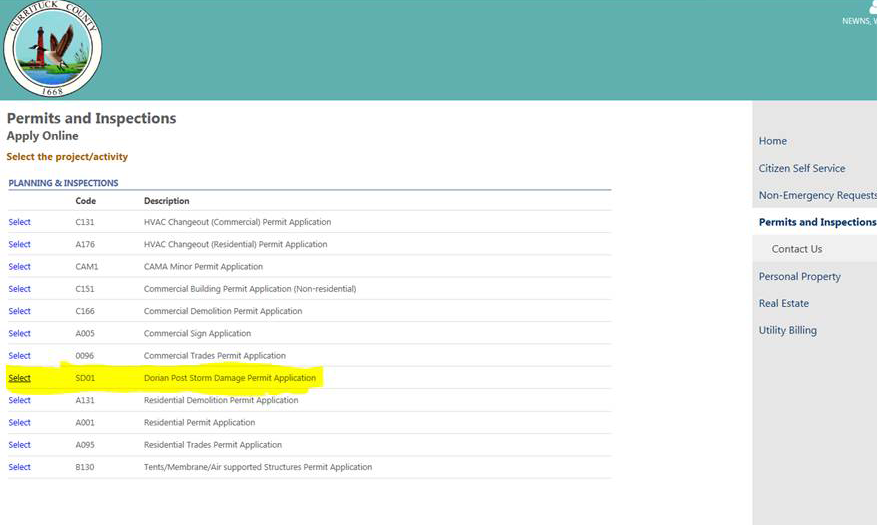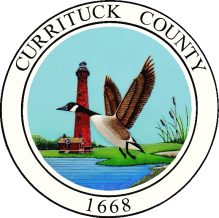Currituck County has several ways to report damage to your property, somethings to remember before you start your report.
- Residential work that does not exceed $15,000 in total cost and does not involve work of a structural nature does not require a permit. (shingles, siding, deck boards, railings)
- Replacement of roof sheathing, joist, rafters, girders, load bearing memebers require a building permit regardless of the cost.
- Even though you may have repairs that do not require a building permit, structures in flood zones that have been flooded need to be evaluated for FEMA regulations.Depending on the level damage you may have to meet substantial damage requirements that are part of the National Flood Program and proceeding without this evaluation could be a costly mistake for you.
- Before proceeding with any repair work on a flooded structure please contact our inspection 252-232-3378 for further information or to arrange for an inspection.
To speed up the application process bring our storm damage application with you to our office. For information the application has a drawing for beach access walkways for residential dwellings.
Currituck County’s Self Damage Reporter
Use the self damage system to report property damage from Hurricane Dorian. The county uses this information to assess damage for inspection and federal funding.
Online Permitting Software
 For those of you that use our online permitting software we have opened up our online application for post storm damage, it is labeled “Dorian Post Storm Damage Application” please use this application when applying online with Citizen Self Service for any repair work that was caused by the storm so we can track post storm damage for FEMA funding.
For those of you that use our online permitting software we have opened up our online application for post storm damage, it is labeled “Dorian Post Storm Damage Application” please use this application when applying online with Citizen Self Service for any repair work that was caused by the storm so we can track post storm damage for FEMA funding.
We have also opened up our online self damage reporter for our citizens so they can add damage during and post storm damage reporting.
Citizens to Be Wary of Illegitimate Contractor Scams in Aftermath of Hurricane Dorian
North Carolina Licensing Board for General Contractors (NCLBGC) has a Press Release to warn citizens about scam artist and what to look for. The release states:
In the aftermath of Hurricane Dorian, thousands of North Carolinian’s with damaged homes, businesses and other property will be prime targets for scam artists.
The North Carolina Licensing Board for General Contractors (NCLBGC) is advising citizens to exercise extreme caution to avoid becoming further victimized by scam artists posing as legitimate contractors. The NCLBGC reminds citizens that licensed general contractors have passed an examination and have met the financial requirements for being a licensed general contractor in the State of North Carolina.
“Unfortunately, natural disasters like Hurricane Dorian lead to an increase in individuals posing as legitimate licensed contractors in an effort to prey upon vulnerable citizens,” said C. Frank Wiesner, Executive Director, NCLBGC. “Individuals who hire unlicensed contractors are putting themselves at great financial risk.”
The North Carolina Licensing Board for General Contractors reminds North Carolinian’s of the following:
- Any project quoted at $30,000 or more requires a valid NC general contractors license.
- Projects less than $30,000 do not require a license. However, hiring a NC licensed general contractor may offer security in knowing that you are dealing with a legitimate contractor who is authorized to engage in construction or repairs.
- Ask for proof that the contractor is licensed. Citizens can verify if the contractor is properly licensed by:
- searching on the NCLBGC’s website at www.nclbgc.org;
- calling the NCLBGC at 800-220‐7185; or
- downloading the Board’s free mobile app for Apple and Android devices by entering “NCLBGC SEARCH” in the search feature.
- Be wary of door‐to‐door repair solicitations or people who demand payments in cash.
- Require a written contract that details the work to be done, materials to be used, a payment schedule and a timeline for work to be completed. A licensed contractor is required to list their license number on all contracts.
- Contact your insurance company before beginning any work.
- Contact the local permitting office or inspections department to determine if permits are required to assure building code compliance. If permits are required, be sure the contractor acquires them before construction begins.
- Before making final payment, evaluate the completed work and ask your contractor to confirm that all subcontractors and suppliers have been paid to eliminate potential liens on your property.
The North Carolina Licensing Board for General Contractors is the state agency that issues licenses to over 28,000 licensed general contractors in North Carolina. Additional information is available at www.nclbgc.org or by calling 800-220-7185 or 919-571‐4183

